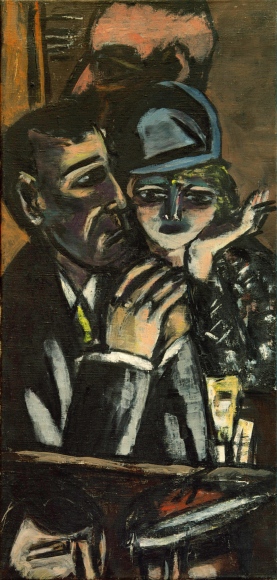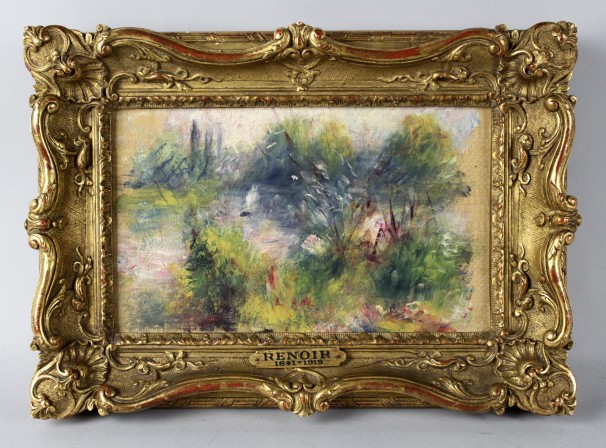Just days after attorneys for Cornelius Gurlitt floated the idea of discussions with survivors and heirs for a possible resolution to the questions about the artworks found in his apartment two years ago that are suspected of having been stolen or sold under duress during the Nazi era (and after the prosecutor was ordered to make a full list available to journalists), the prosecutor in charge of the investigation categorically rejected the possibility of any deal with Gurlitt.
Augsburg Prosecutor Rejects Idea of Making Deal with Gurlitt, Harvard and LACMA Beckmann Paintings Highlight Difficulty Ahead Without Agreement
Topics: Erhard Göpel, Frankfurter Allgemeine Zeitung, Stuttgart, Wiesbaden, FAZ, Focus, Hildebrand Gurlitt, Cornelius Gurlitt, Augsburg, Amsterdam, Willi Korte, Schwabinger Kunstfund. Kunstfund München, Marvin Fishman, Reinhard Nemetz, Gurlitt Task Force, Germany, Fall Gurlitt, The Art Newspaper, Gurlitt Collection, Max Beckmann, Karl Buchholz, Robert Looker, Entartete Kunst, Bar Braun, Beutekunst, Schwabing, Magdeburg, LACMA, Ersessene Kunst, Harvard, Gurlitt, Bavaria, Busch-Reisinger, Los Angeles County Museum of Art, degenerate art, the Central Collecting Point, Augsburger Staatsanwalt, www.lostart.de, Nazi art, Sotheby's, Roman Norbert Ketterer, Raubkunst, Verjährung, Mayen Beckmann, National Gallery Berlin, verschollene Kunst, De-Nazification, Selbstbildnis, Self Portrait
Cornelius Gurlitt’s Lawyers File Privacy Complaint
In one of the first affirmative steps taken by Cornelius Gurlitt since the revelation of the seizure of a large number of artworks with possible Nazi-seizure connections, Gurlitt has filed a criminal complaint concerning his allegations of violations of his privacy rights. According to Gurlitt’s attorney, “The surrender of investigative information to the press, and with it the severe damage to his personal rights is not tolerable in any way for Mr. Gurlitt. . . . This is a blatant violation of official secrecy.” Another of his lawyers went on to express concern for trust in the process in which details were being given to the media. In particular, Gurlitt’s team were most upset about photographs in the Focus piece that broke the story of Gurlitt’s apartment.
Topics: Stuttgart, Das Alte Schauspielhaus, Cologne, Irina Alter, veschollene Kunst, Schwabinger Kunstfund, Wiedergutmachung, Annette Weber, Hildebrand Gurlitt, Cornelius Gurlitt, Corinna Budras, S. Lane Faison, Universität Heidelberg, Augsburg, Institute for Jewish Studies Heidelberg, Aryanization, Anat Feinberg, Willi Korte, Schwabinger Kunstfund. Kunstfund München, Monuments Man, Gurlitt Task Force, Germany, Fall Gurlitt, Köln, Nazi-looted art, Henry Keazor, Gurlitt Collection, Appropriated Art the Gurlitt Case, Kurpfälzisches Museum Heidelberg, Hochschule für Judische Studien Heidelberg, Eberhard Karls-Universität Tübingen, Emily Löffler, CSU, Williams College, Judische Allgemeine, Hildebrand Gurlit, Entartete Kunst, Universität Zürich, Arisierung, Lehrstuhl für Römisches Recht und Privatrecht, Nürnberger Institut, Rückgabe, Rhein-Neckar Morgenweb, Beutekunst, 'Stürmer-Bibliothek', Magdeburg, Daniel Krochmalnik, Ersessene Kunst, Katja Terlau, Art Loss Recovery Unit, Jim Tobias, Rhein-Neckar Zeitung, Fritz Backhaus, Gurlitt, Bavaria, Johannes Heil, Wien, Sullivan & Worcester LLP, Lucas Elmenhorst, Kunsthistorisches Institut, Nürnberg, Jüdisches Museum Frankfurt, Looted Art, „Sturmer-Library“, degenerate art, Boston, Seminar für Neuere Geschichte, Wolfgang Ernst, www.lostart.de, Nazi art, Raubkunst, Nicholas M. O'Donnell, Frieder Hepp, Verjährung, Vienna, Münchner Kunstfund, New York, FAZ Frankfurt, Felicitas Heiman-Jellinek
Gurlitt Attorney Speaks of Discussions with Heirs and “Fair and Equitable Solution,” Challenges Earlier Quote Despite Video of Interview
One of Cornelius Gurlitt’s attorneys, Hannes Hartung, told the Wall Street Journal last week, and was again quoted in the Frankfurter Allgemeine Zeitung yesterday, that Gurlitt was open to possible resolutions to claims from heirs to the paintings found in his apartment in 2012. According to Hartung, Gurlitt is already in talks with heirs, and wants a “fair and equitable solution.” 
Topics: Frankfurter Allgemeine Zeitung, Ich geb' nichts freiwillig zurück, FAZ, veschollene Kunst, Focus, Hannes Hartung, Cornelius Gurlitt, Schwabinger Kunstfund. Kunstfund München, Fall Gurlitt, The Art Newspaper, Gurlitt Collection, Max Beckmann, Hildebrand Gurlit, Entartete Kunst, Bar Braun, Özlem Gezer, Beutekunst, LACMA, Gurlitt, David D’Arcy, Der Spiegel, Wall Street Journal, Los Angeles County Museum of Art, degenerate art, Raubkunst
Chabad Asks for Interim Judgment of $14.75 Million Against Russia for Defiance of Order to Return Rebbe's Library
It has been a year since the U.S. District Court for the District of Columbia instituted a fine of $50,000 per day against the Russian Federation, the Russian Ministry of Culture and Mass Communications, the Russian State Library, and the Russian State Military Archive until they comply with a 2010 judgment to return the library of Menachem Schneerson, the late charismatic leader of the worldwide Chabad Lubavitch movement, to the movement in Brooklyn, New York. And in that year, the Russian defendants have neither obeyed the original judgment, nor paid the fine. The plaintiffs have now returned to court asking for an interim money judgment for the cumulative amount—$14,750,000—a judgment that could in theory be executed on other assets.
Topics: Russian art embargo, Russian State Military Archive, Germany, Rebbe, 28 U.S.C. § 1603, 1939, the Russian Ministry of Culture and Mass Communica, Russian Federation, the Russian State Library, FSIA, Agudas Chasei Chabad, Soviet Union, Chabad
Recap of Ersessene Kunst—Der Fall Gurlitt (Appropriated Art—The Gurlitt Case): January 26, 2014 in Heidelberg
I’ve just returned from my presentation in Heidelberg at the Hochschule für Jüdische Studien in Heidelberg at the conference Ersessene Kunst—Der Fall Gurlitt; Appropriated Art—The Gurlitt Case. The presentations were, without exception, outstanding. They ranged from rarely-told case stories, to sharp insights of some of the overarching principles that guide the the Gurlitt case and similar events. As the discussions made clear, this case will not be easily resolved. That in turn makes recent reports that Cornelius Gurlitt has indicated a willingess to discuss the art's return all the more significant.
Topics: Maria Altmann, Leopold Reidemester, Ministerin für Justiz und Kultur, Stuttgart, Das Alte Schauspielhaus, Cologne, Irina Alter, Portrait of Adele Bloch-Bauer, veschollene Kunst, Focus, Schwabinger Kunstfund, Aschbach Castle, Mussolini, Wiedergutmachung, Annette Weber, Monte Cassino, Cornelius Gurlitt, Corinna Budras, S. Lane Faison, Breslau, Universität Heidelberg, Augsburg, Aryanization, Anat Feinberg, Willi Korte, Schwabinger Kunstfund. Kunstfund München, Monuments Man, Jud Süss, Wrocław, Dresden, Gurlitt Task Force, Germany, Silesia, Fall Gurlitt, Wallraf-Richartz Museum, Köln, Nazi-looted art, Henry Keazor, Gurlitt Collection, Appropriated Art the Gurlitt Case, Schloss Aschbach, Die Welt, Kurpfälzische Museum Heidelberg, Hochschule für Judische Studien Heidelberg, Karl Haberstock, Eberhard Karls-Universität Tübingen, Emily Löffler, CSU, Williams College, Hildebrand Gurlit, Entartete Kunst, Universität Zürich, Arisierung, Lehrstuhl für Römisches Recht und Privatrecht, Württemberg, Schlesien, Nürnberger Institut, Hamburg, Otto Förster, Rückgabe, Beutekunst, 'Stürmer-Bibliothek', Magdeburg, Portrait of Amalie Zuckerkandl, Ersessene Kunst, Katja Terlau, Art Loss Recovery Unit, Jim Tobias, Hermitage, Gurlitt, Bavaria, Johannes Heil, Wien, Sullivan & Worcester LLP, Lucas Elmenhorst, Events, Kunsthistorisches Institut, Nürnberg, Jüdisches Museum Frankfurt, Looted Art, „Sturmer-Library“, degenerate art, Seminar für Neuere Geschichte, Wolfgang Ernst, Justizminister, Göring, www.lostart.de, Nazi art, Raubkunst, Nicholas M. O'Donnell, Frieder Hepp, Verjährung, Vienna, Claudius Krausharr, Münchner Kunstfund, Zwickau, Kajetan Mühlmann, New York, Werner Haftmann, FAZ Frankfurt, Felicitas Heiman-Jellinek
Bankruptcy Court Denies Creditors’ Motion to Reappraise Detroit Institute of Arts Collection
As we predicted when it was filed, Judge Rhodes of the U.S. Bankruptcy Court for the Eastern District of Michigan denied today several creditors’ motion to appoint an independent commission to appraise the collection of the Detroit Institute of Arts (owned by the city of Detroit) as part of the city’s ongoing bankruptcy.
Topics: Governor Rick Snyder, Judge Rhodes, Christie's, Detroit Institute of Arts, Bankruptcy Code, Michigan, Emergency Manager Kevyn Orr, Detroit Bankruptcy
“Appropriated Art—the Gurlitt Case,” Heidelberg, Germany January 26, 2014
The Institute for Jewish Studies in Heidelberg (the Hochschule für Judische Studien Heidelberg) will host a one-day conference on January 26, 2014 entitled “Appropriated Art—The Gurlitt Case” (Ersessene Kunst—Der Fall Gurlitt). Leading academics, journalists, and researchers will put the Gurlitt find into a historical and legal perspective. As listed below, the depth of topics that will be presented is outstanding. Last, and very much least, I will present on the efficacy, challenges, and policy considerations in U.S. art restitution litigation.
Topics: Stuttgart, Das Alte Schauspielhaus, Cologne, Irina Alter, Schwabinger Kunstfund, Wiedergutmachung, Annette Weber, Hildebrand Gurlitt, Cornelius Gurlitt, Corinna Budras, Universität Heidelberg, Institute for Jewish Studies Heidelberg, Aryanization, Anat Feinberg, Fall Gurlitt, Köln, Nazi-looted art, Henry Keazor, Gurlitt Collection, Appropriated Art the Gurlitt Case, Kurpfälzische Museum Heidelberg, Hochschule für Judische Studien Heidelberg, Eberhard Karls-Universität Tübingen, Emily Löffler, Entartete Kunst, Universität Zürich, Arisierung, Lehrstuhl für Römisches Recht und Privatrecht, Nürnberger Institut, Rückgabe, Beutekunst, 'Stürmer-Bibliothek', Daniel Krochmalnik, Ersessene Kunst, Katja Terlau, Jim Tobias, Fritz Backhaus, Johannes Heil, Wien, Sullivan & Worcester LLP, Events, Kunsthistorisches Institut, Nürnberg, Jüdisches Museum Frankfurt, Looted Art, „Sturmer-Library“, degenerate art, Boston, Seminar für Neuere Geschichte, Wolfgang Ernst, Raubkunst, Nicholas M. O'Donnell, Frieder Hepp, Vienna, Münchner Kunstfund, New York, FAZ Frankfurt, Felicitas Heiman-Jellinek
Foundations Pledge $330 Million to Keep Detroit Institute of Arts Collection Safe from Liquidation
Detroit Emergency Manager Kevyn Orr’s plan to monetize the collection of the Detroit Institute of Arts, whether by sale or otherwise, took a large step towards realization today when at least nine local and national foundations pledged up to $330 million to Detroit to keep the collection of the Detroit Institute of Arts safe from sale, loan, or other encumbrance, and also to shore up pension funds Following the release of Christie’s appraisal report, and weeks of rumors that a “grand bargain” was in the works to raise money in exchange for keeping DIA’s art collection out of any plan of adjustment for the city’s bankruptcy, the Detroit Free Press reports today that federal mediator and U.S. District Court Judge Gerald Rosen released a statement outlining the pledge. The foundations identified are the Community Foundation for Southeast Michigan, the Kresge Foundation, the Ford Foundation, the John S. and James L. Knight Foundation, the William Davidson Foundation, the Fred A. and Barbara M. Erb Family Foundation, the Hudson-Webber Foundation, the McGregor Fund and the Charles Stewart Mott Foundation.
Topics: Old Master, the Ford Foundation, Mark Stryker, Chapter 9, the Fred A. and Barbara M. Erb Family Foundation, the Hudson-Webber Foundation, 11 U.S.C. § 904, Impressionism, Amedeo Modigliani, Michelangelo, the John S. and James L. Knight Foundation, the William Davidson Foundation, Judge Rhodes, Christie's, valuation, Scheme for the Decoration of the Ceiling of the Si, Appraisal, Modernist Art, Detroit, the McGregor Fund, Eugene Driker, Detroit Institute of Arts, Bankruptcy, Gerald Rosen, the Kresge Foundation, the Charles Stewart Mott Foundation, Detroit Emergency Manager, Kevyn Orr, Detroit Free Press, eligibility, Detroit Bankruptcy, the Community Foundation for Southeast Michigan
Baltimore Museum of Art Wins Title to “Flea Market Renoir” Painting
The Baltimore Sun reports that U.S. District Judge Judge Leonie Brinkema allowed the Baltimore Museum of Art’s motion for summary judgment at today’s hearing in Alexandria, Virginia. That means that the BMA is the owner of the painting, not claimant Martha Fuqua, who argued that she bought the painting at a 2009 flea market in good faith. Barring an appeal (or perhaps even with one), the painting will soon return to Baltimore from where it was stolen in 1951.
Topics: hearsay, Pierre-Auguste Renoir, Potomack Company, flea market Renoir, ancient documents, Der Spiegel, Martha Fuqua, Baltimore Museum of Art, Litigation, business records exception, summary judgment, Museums, Leonie Brinkema, Paysage Bords de Seine, FRCP 56
Hearing Tomorrow on Baltimore Museum of Art Claims to "Flea Market Renoir"
Judge Leonie Brinkema will hold a hearing tomorrow morning in Alexandria, Virginia on the Baltimore Museum of Art's motion for summary judgment to claim ownership to an 1879 Renoir painting Paysage Bords de Seine that the museum maintains was stolen in 1951. Claimant Martha Fuqua filed a motion to strike the BMA's reply to her opposition, arguing that the museum was introducing new evidence. The court swiftly denied the motion, and noted that the museum was responding to arguments she made for the first time in her opposition to the summary judgment motion (but gave her permission to file a sur-reply).
Topics: hearsay, authentication, Pierre-Auguste Renoir, Potomack Company, flea market Renoir, ancient documents, Der Spiegel, Martha Fuqua, Baltimore Museum of Art, Litigation, business records exception, summary judgment, Museums, Paysage Bords de Seine, FRCP 56





